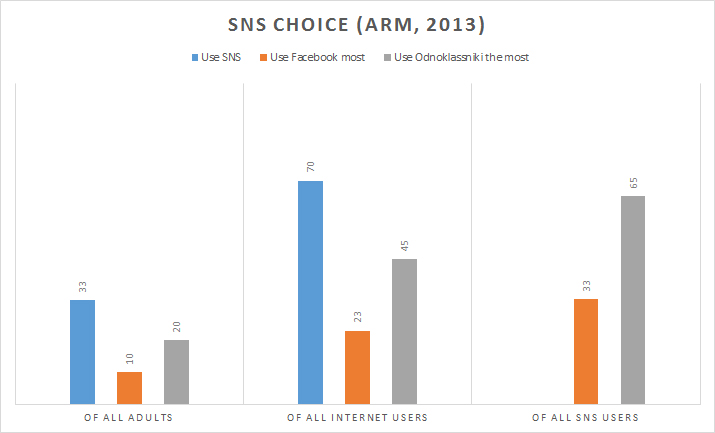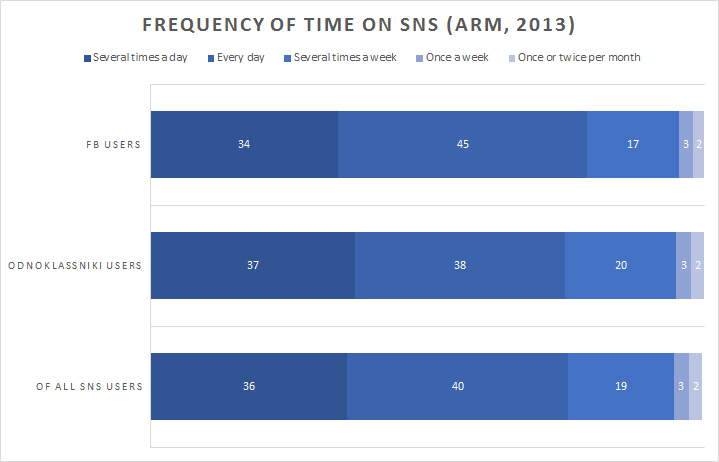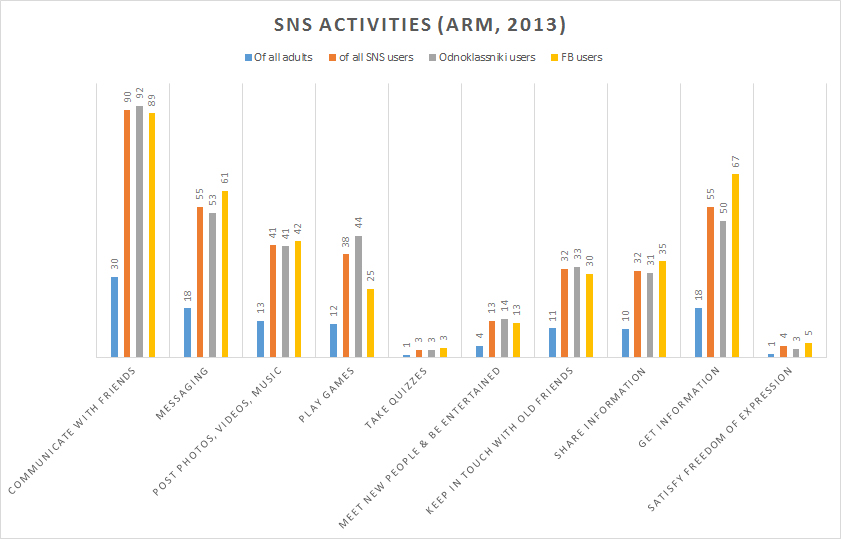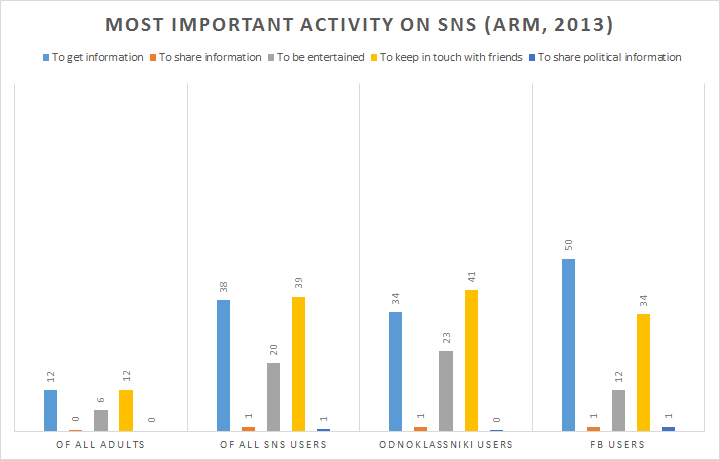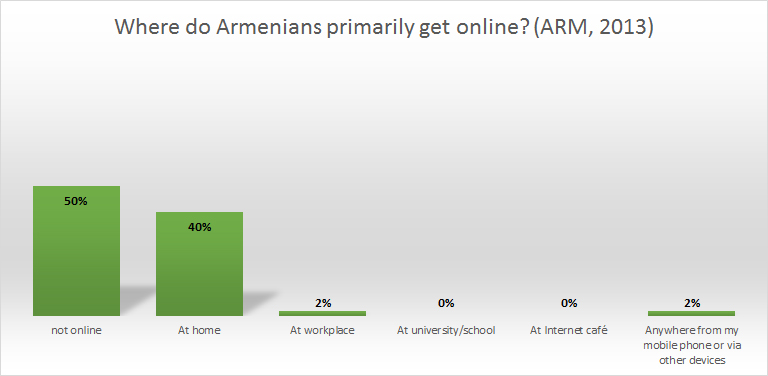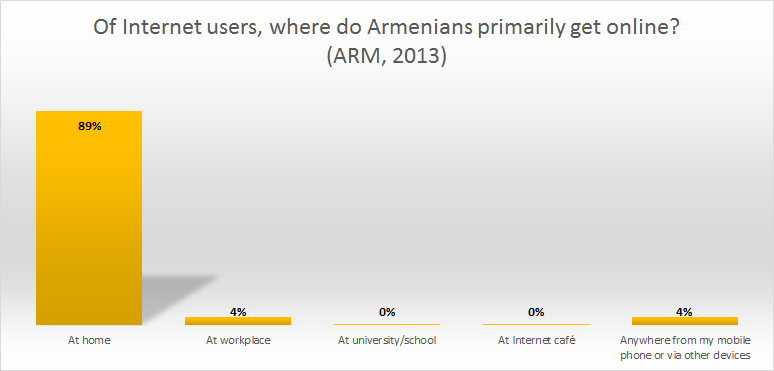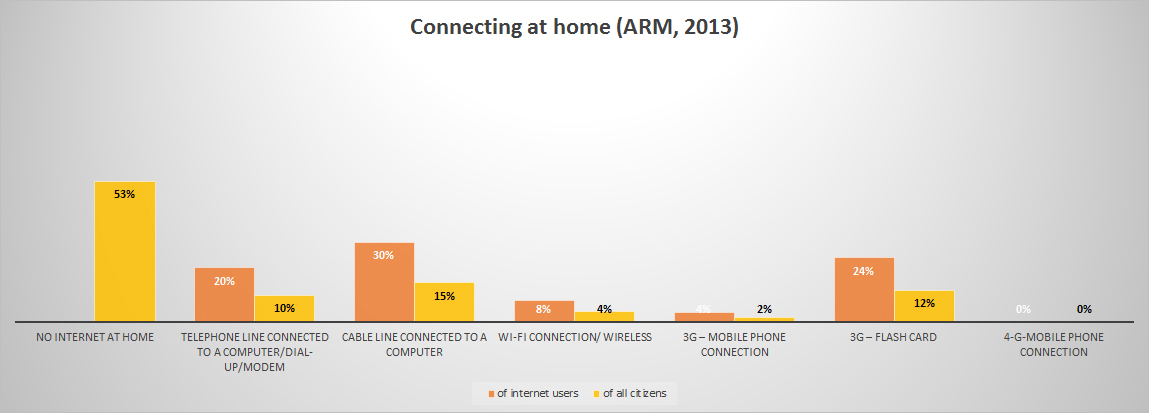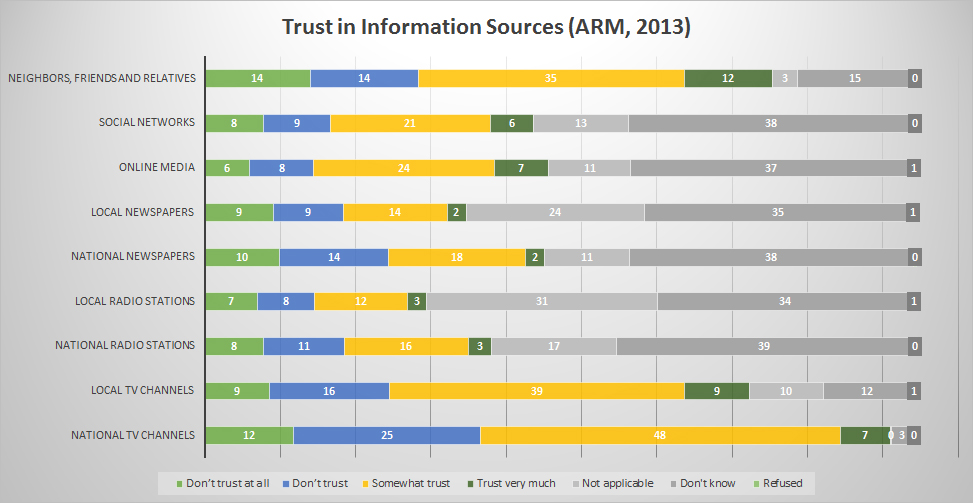Hashtags day before election
#azvote13 mid-September – October 8
Interesting changes here. Group 1, the pro-government forces, are a really tight cluster now. They used to be much less close. Seems like they’re talking to each other more now.
Group 3 is a VERY tight cluster of oppositionists. Strong ties exist between Group 3 and Group 4, centered around muntezir. Group 5 is foreigners and Azerbaijanis that hang out with foreigners.
#azvote13 October 2 – October 8
#azvote13 October 7 – October 8
#secki2013 October 2 – October 8
This is much less contentious than #azvote13.
10/15 talk: The reproduction and amplification of gender inequality online: The case of Azerbaijan
The reproduction and amplification of gender inequality online: The case of Azerbaijan
abstract:
Inequalities found offline are replicated and are often amplified online. Results from a nationally representative survey in Azerbaijan, an authoritarian post-Soviet petrostate with a tradition of gender inequality, demonstrates that being female is not only a barrier to Internet use, but the strongest barrier to Internet use, frequency, and capital-enhancing online activities. While this study cannot explain why being female has such an effect on access, use, and Internet activities, acknowledging the relative importance of can provide insight into potential targets or entry points for an intervention.
As part of the CHANGE seminar at UW.
10/15 12noon-1pm
Election week hashtag analyses
I’ll be continuing to monitor the hashtags, but here is where we stand on Monday morning before the Wednesday election:
#secki2013 for the weekend – pretty dead, but probably will pick up in the coming days
full analysis
#secki2013 for the past 10 days
full analysis
Opposition blogger muntezir is the most powerful tweeter in the network, but groups 3 and 4 are pro-government forces and are really loud on this hashtag.
#azvote13 for the weekend
full analysis
In this hashtag, the pro-government forces (group 2) are “winning” – being louder than the opposition forces. Although muntezir in group 4 and group 3 being a lot of oppositionists and their foreign friends are still holding strong.
#azvote13 since mid-September
full analysis
This tells a great story – while the pro-government forces (group 1) are very loud on this hashtag, all the other big clusters are very well connected and spreading information widely.
Social Networking Sites in Armenia – Facebook for Elites, Odnoklassniki for Everyone Else
(This is a continuation of a post I made in 2010 about this issue. This analysis based on the 2013 Alternative Resources in Media dataset.)
So, the social networking site that one spends time on isn’t arbitrary. Research tells us that generally people go where their friends are, but also that there are demographic differences in site choice. A study of MySpace versus Facebook in 2007 is the classic case of this. For a variety of reasons, wealthier and more educated people were on Facebook and poorer and less educated people were on MySpace. Nowadays in the U.S., Facebook has sort of taken over the social networking space and a lot of those demographic differences have gone away.
In the 2010 analysis posted above, Facebook in Armenia was quite elite while Odnoklassniki was not. Some reasons include that Odnoklassniki was more accessible on for free or cheap on mobile devices, the Russian language interface was more accessible to those without English skills (at the time Facebook was mainly an English language platform), Odnoklassniki was more about fun (and porn), and Facebook wasn’t great on a mobile device.
Fast forward to 2013, and things have changed. Facebook has grown a lot globally. The Facebook mobile platform is very user-friendly. Russian and Armenian versions of Facebook work quite well. More Armenians are online as well.
So I looked once again at use. Let’s first look at the overall picture before going into the demographic differences.
(Note that this is PRIMARY SNS, they could have accounts on the other site.)
First you can see that a third of all Armenian adults are on a social networking site and 70% of all adult Armenian Internet users are on a social networking site. The Odnoklassniki versus Facebook breakdown is that 10% of all Armenian adults are on Facebook, but 20% of all Armenian adults are on Odnoklassniki. Of Internet users, less than a quarter are on Facebook while nearly half (45%) are on Odnoklassniki. The comparative breakdown is a third of SNS users on Facebook and two-thirds on Odnoklassniki.
In terms of the time that is spent on the social networking site, there weren’t tremendous differences. About a third are on the SNS several times a day and most of the rest of the users are on the SNS at least once a day.
So who is on each site?
(This is based on an ANOVA):
There is no difference in age between Facebook and Odnoklassniki and other SNS users in AGE. However, non SNS users are much older. It is the same story with ECONOMIC WELLBEING – non SNS users are poorer than SNS users. The same is for RUSSIAN skills – the only difference is with non-SNS users and users.
ENGLISH skills – Facebook users (and other SNS users, but they’re weird, so let’s ignore them) have statistically significantly higher English skills than others.
Facebook users are also statistically significantly higher in EDUCATION than everyone else.
No differences in SEX.
So, we can summarize that Facebook users are more elite – English speaking and better educated. Thus, not a big chance from 2010.
(This is based on a multinominal logistic regression):
Looking at this 2013 data, the determinants of being an Odnoklassniki user are the following. In this analysis, all the different factors consider each other, so for example, the influence of higher education on English language skill is cancelled out, so each variable is really telling its own story.
First, Sex – men are more likely to be on Odnoklassniki than women. Next, Russian language skills – those with better Russian are more likely to be on Odnoklassniki than those with poor Russian. Then English skills matter. Then education.
Determinants of being on Facebook are first English skill. Better English means more likely to be on Facebook. Next, higher education. Russian language skill matters next.
For both Odnoklassniki and Facebook, age and economic status didn’t matter much. However, younger and wealthier people are more likely to be online. So it appears that once you’re online, your choice of social networking site is more about language skills and education.
So, with that, what are people doing on social networking sites?
Remember that Facebook users are more “elite” – so the activities they do will likely be more elite as well.
In terms of communicating with friends, posting photos, and entertainment no big differences between the sites. However, Facebook users are more interested in getting and sharing information. Odnoklassniki users are also playing more games than Facebook users.
When asked what the most important activity on a social networking site, Facebook users were much more likely to say getting information.
When asked about sharing political and social information, Facebook users are much more likely to share than Odnoklassniki users. But the majority of all social networking site users aren’t sharing (they say!).
Talk on 10/10: Maintaining scholarly distance, developing trust, and protecting sources online and offline in an authoritarian context
Pearce, K. E. (2013, October). Maintaining scholarly distance, developing trust, and protecting sources online and offline in an authoritarian context. Digital methods, ethical challenges: A symposium hosted by the Annenberg School Center for Global Communication Studies and the Project for Advanced Research in Global Communication, Philadelphia, PA.
Doing research in authoritarian states is not easy. While all research has challenges of access and credibility, with authoritarian states the hurdle height is raised. Yet academics tend to not talk about it (Goode, 2010) out of fear of losing access and credibility and because of the desire to do the research (Romano, 2006). Given that the “culture of fear” (Mitchell, 2002) in authoritarian states permeates every possible research method that is considered acceptable in traditional social science journals, researchers are left with few options.
With the development of increased information and communication technology, some scholars excitedly viewed the Internet as a way to access subjects in authoritarian states in a way that was not possible before the Internet. However, a whole additional host of challenges emerge when one uses the Internet to conduct research and when studying phenomena in authoritarian contexts, there are additional security and ethics concerns that are exacerbated by conducting research online. Yet the Internet does afford some benefits for research in this sort of environment, although researchers face new ethical questions that need to be addressed.
This presentation will detail some of the challenges and benefits of using the Internet for research in authoritarian states and what understanding ethical strategies in an environment where the wrong move can have grave impact can bring to the broader research community.
It is open to the public and a video will be available eventually.
Transnational Families in Armenia and Information Communication Technology Use
New study out today.
Considerable evidence has shown that migrants use ICT to maintain connections to their families and home. Unlike most previous researchers of migrant ICT use, we study those left behind. Using a nationally representative sample in which two thirds of respondent households have a migrant, we determine the effect of this on ICT use. Multivariate analyses including relevant demographic factors that influence both migration and ICT use reveal that transnational (migrant) family status influences frequency of Internet use, Internet ownership, and Skype use, but not other activities. Given the positive social effects of maintaining family connections, ICT use may lessen the negative effects of migration on families and society.
This study uses the 2011 Alternative Resources in Media dataset done by CRRC.
The Internet Cafe is dead – most Armenians get online at home
More from the new Alternative Media USAID-CRRC dataset.
Most Armenians are getting online (primarily) from home. (I wish that it had had some sort of ranking or estimate of hours, but it is what it is.)
And how do people get online at home? Cable, 3G flash card, and still dial up (I can do a breakdown by urban/rural if people are interested.)
I’ll do another post about mobile Internet in the future.

What are Armenians doing online in 2013?
Here’s an update to this 2012 post.
Green is of Internet users and blue is for all Armenian adult citizens.
In the near future I’ll do a break down of these activities by region, sex, etc.
In this recent publication of mine, we show that rural, less educated, and poorer Armenians weren’t engaging in capital-enhancing activities like news reading or blogging. Will this still be true in 2013?
Media trust in Armenia – a methodological mess
A few years ago I wrote a report summarizing a USAID-funded CRRC-conducted study of the Armenian media environment. They re-did this study this summer (no report seems to be available yet), but the data is up so I will be slowly but surely posting some findings.
Let’s start with media trust.
This graphic makes it appear that Armenians trust online media more than any other source of media. Wow! Go Internet!
But when you look at the frequencies, you see that Armenians were pretty ambivalent about answering questions on media trust. More than a third said that they didn’t know for every type except interpersonal (neighbors, friends, and relatives), local TV, and national TV. And many had “not applicable” (which I take to mean that they don’t consume that type of media). For what it’s worth, if don’t knows are higher than 10%, generally the question is considered “questionable.”
This is why even though I LOVE online data analysis tools, I get a little nervous about people just jumping in and making conclusions without understanding how surveys and statistics work.
More posts on this data to come!











